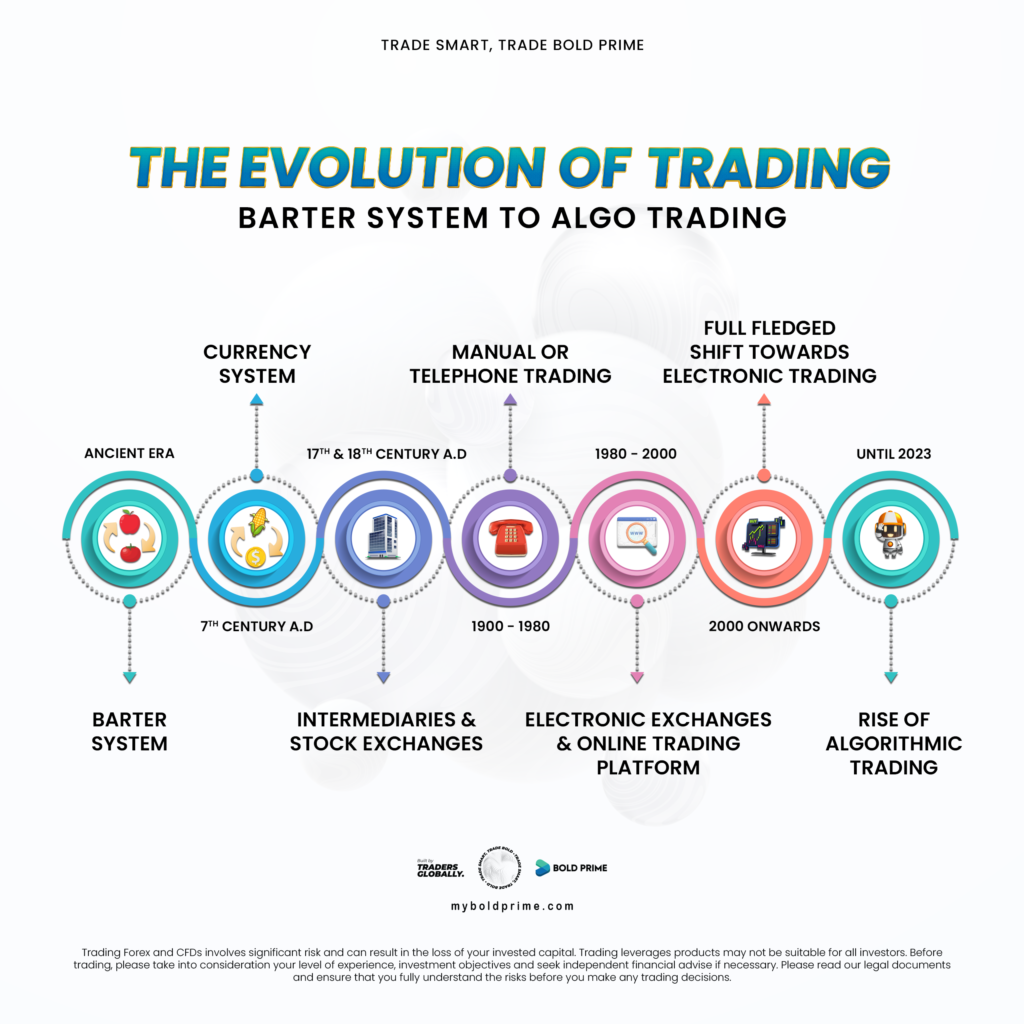Introduction:
In the contemporary trading landscape, algorithmic systems have taken center stage, captivating traders worldwide. But how did this revolutionary journey begin, and what is the historical backdrop of trading practices?
Embark on a journey through the evolution of trading, commencing with the barter system and advancing to contemporary trading practices.
Barter system – Ancient era:
The roots of trading extend back to the barter system, where goods were exchanged directly. This ancient practice, although rooted in mutual agreement, faced challenges due to the double coincidence of wants, prompting the need for a more efficient system.
Currency system (7th century A.D):
As societies burgeoned, the barter system became impractical, leading to the emergence of various currencies, from beads and metals to standardized coins and paper money. The introduction of currency streamlined the trading system, providing a medium of exchange and a unit of account.
Intermediaries and Stock Exchanges (17th and 18th century):
The 17th and 18th centuries witnessed the advent of stock exchanges, ushering in a structured hub for buying and selling company shares. Financial intermediaries, such as banks and merchants, emerged to facilitate transactions, safeguard deposits, and extend credit.
Manual or Telephone Trading (1900 to 1980):
The late 1900s saw the transformative impact of the telephone, enabling real-time communication between brokers and traders. This era emphasized speed and efficiency, allowing traders to seize opportunities and gather market information effortlessly.
Electronic exchanges and online trading platforms (1980 to 2000):
A pivotal turning point occurred between 1980 and 2000 with the rise of electronic exchanges and online trading platforms. Computerized order routing systems and Electronic Communication Networks (ECNs) revolutionized trading by allowing electronic order execution. Online platforms, like E*TRADE and Charles Schwab, democratized access, empowering retail investors.
Full fledged shift towards Electronic Trading (2000 to 2006):
In the early 2000s, major exchanges, including the New York Stock Exchange (NYSE), underwent a transformative shift towards electronic trading. The introduction of the Hybrid Market Model in 2006 combined electronic order matching with traditional floor-based trading, marking a significant milestone.
Rise of Algorithmic Trading (2007 – 2023):
Algorithmic trading has witnessed exponential growth since 2007, leveraging technology, market data, and incorporating machine learning and artificial intelligence. Regulatory focus ensures a delicate balance between innovation and market integrity, contributing to the continued evolution of trading practices.
Conclusion:
The evolution of trading practices has significantly transformed financial markets, offering advantages such as efficiency, accessibility, enhanced market liquidity, and global integration. While challenges persist, effective regulatory frameworks and continuous innovation are essential for ensuring the sustainability and integrity of financial markets.
In the current landscape, trading methodologies not only enable sophisticated risk management, foster transparency, and open doors for innovation but also demand a strategic approach to regulatory frameworks, vigilant monitoring, and robust risk management measures. Achieving a delicate equilibrium between promoting innovation and upholding market integrity is imperative. Consistent assessment of evolved trading practices, ongoing technological advancements, and a steadfast commitment to investor protection are indispensable for ensuring the enduring viability of financial markets.
































